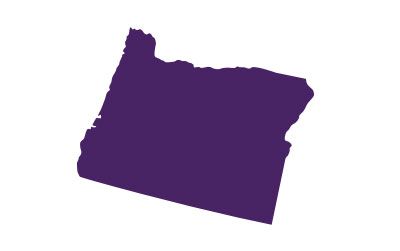Alzheimer’s disease is a growing public health crisis in Oregon. The impact of Alzheimer’s is projected to rise, and the most recent data show:

- 79,000 people aged 65 and older are living with Alzheimer’s in Oregon.
- 9.5% of people aged 45 and older have subjective cognitive decline.
- 170,000 family caregivers bear the burden of the disease in Oregon.
- 229 million hours of unpaid care provided by Alzheimer’s caregivers.
- $5.2 billion is the value of the unpaid care.
- $317 million is the cost of Alzheimer’s to the state Medicaid program.
These numbers show that a public health approach is necessary to lessen the burden and enhance the quality of life for those living with cognitive impairment and their families.
Learn more about Oregon: Alzheimer’s Statistics (PDF), Cognitive Decline (PDF), Dementia Caregiving (PDF), Risk Factors (PDF), County-Level Alzheimer's Prevalence (PDF)
Tribes in your state
Use the HBI Road Map for Indian Country to start conversations with tribal leaders on public health actions that can be taken to support brain health and caregivers. Find tribal leaders and federally recognized tribes in your state: Tribal Leaders Directory.
Public health spotlight
In Oregon, the Public Health Division of the Oregon Health Authority developed indicators of healthy aging including data on cognition and caregiving.
Explore public health action against Alzheimer’s
Learn more about areas essential to addressing Alzheimer's from a public health perspective.
See Public Health Topics
State plan overview
The State Plan for Alzheimer’s Disease in Oregon (SPADO) Task Force was formed in late 2010, coordinated by the Alzheimer’s Association Oregon Chapter. The Task Force included state government agencies, academic researchers, health care providers, family caregivers, state legislators and non-profit organizations. Charged with drafting recommendations to address the most critical needs of Oregonians impacted by Alzheimer’s disease and other dementias, the Task Force gathered public input to inform and validate the proposed recommendations. The State Plan for Alzheimer’s Disease and Related Dementias in Oregon was published in July 2012 and signed by Governor John Kitzhaber. In March 2013, the Oregon Legislature endorsed SPADO by unanimously supporting Senate Concurrent Resolution 1. The SPADO Steering Committee works together to encourage engagement of public and private sector stakeholders to improve the state’s response to community needs associated with Alzheimer’s disease and related dementias and implement the recommendations provided in the state plan.
Resources for action
State and local public health agencies around the country are taking action against Alzheimer’s by implementing the Healthy Brain Initiative: State and Local Road Map for Public Health, 2023–2027. Public health practitioners can learn by example and find resources to help guide their response below.
Oregon Implementation
State:
Issue:
| Oregon Department of Human Services |
Adding Years to Life and Life to Years: A case study of public health's contribution to healthy aging in Oregon |
| Aging and Disability Resource Center (ADRC) of Oregon |
To promote early detection of Alzheimer’s disease among Hispanic populations, the Aging and Disability Resource Center (ADRC) of Oregon adapted an English-language fotonovela -- an educational tool with photos and a story narrative -- for Spanish-language communities. Involvement of promotoras enhanced cultural relevance. The Alzheimer's Association, Oregon Chapter, the Oregon Health Authority, and many other partners now promote and distribute the fotonovela to Spanish-speaking communities, in part through public health networks. |
| Oregon Health Authority |
Aging and Disability Resource Connection of Oregon published ¡Unidos Podemos! Enfrentando la pérdida de memoria en familia, a fotonovela for Spanish-speaking community members on caring for loved ones with Alzheimer’s disease. The Oregon Department of Human Services, Alzheimer's Association Oregon Chapter, and Oregon Health Authority now promote and distribute the fotonovela to Spanish-speaking communities and public health networks. |
Oregon Resources
State:
Issue: